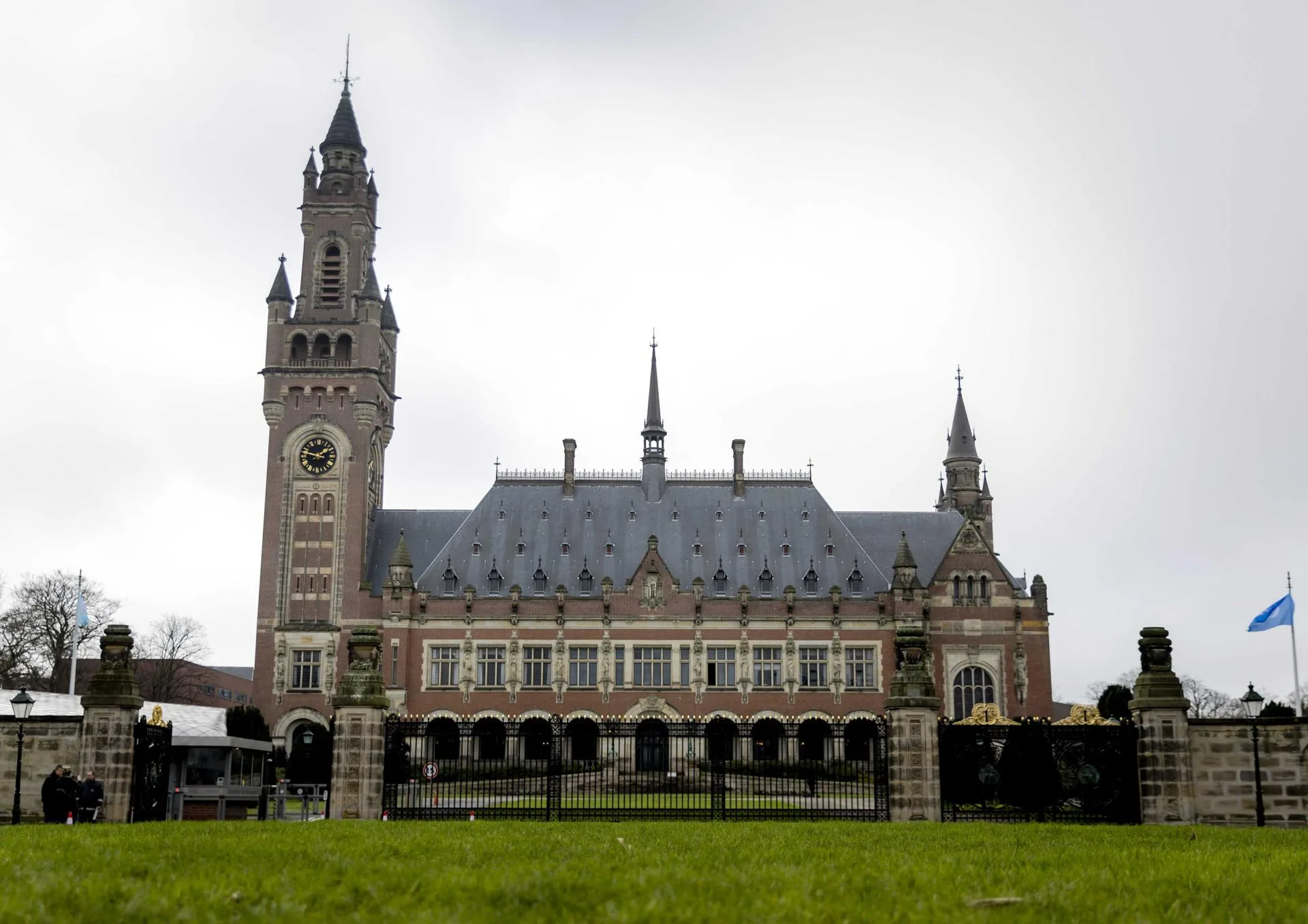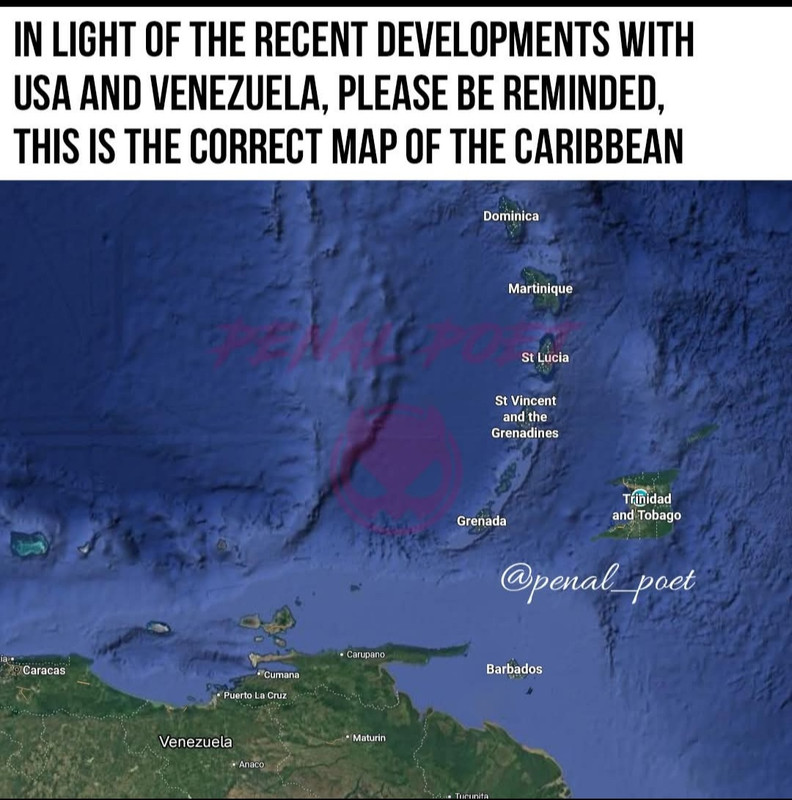You are using an out of date browser. It may not display this or other websites correctly.
You should upgrade or use an alternative browser.
You should upgrade or use an alternative browser.
So Venezuela and Guyana Bout To Go To War
- Thread starter frush11
- Start date
More options
Who Replied?Venezuela claims 60% of Guyanese territory. This dispute dates back over 100 years during British rule and even after Guyanese independence in the 1960s.

Venezuela says they will not recognize an International Court of Justice (ICJ) ruling.

 efe.com
efe.com

Venezuela says they will not recognize an International Court of Justice (ICJ) ruling.

Venezuela will not recognize ICJ decision on dispute with Guyana, says government - EFE
Venezuelan government announced it will not recognize any decision by the International Court of Justice on the dispute with Guyana.
Caracas, Aug 11 (EFE). – The Venezuelan government announced Monday that it will not recognize any decision by the International Court of Justice on the territorial dispute with Guyana over the Essequibo.
“We do not recognize under any circumstances the fraudulent judicial process initiated by Guyana, nor will we abide by any sentence issued in this matter,” said Executive Vice President Delcy Rodríguez, in a statement read to the media.
However, she reiterated that the presentation of this “evidence” does not imply Venezuela’s consent or recognition of the ICJ’s jurisdiction in the dispute with Guyana.
“Venezuela has demonstrated once again the solid legal and factual reasons for its irrevocable historical position of not submitting to third parties, including the ICJ, issues related to its vital interests such as its independence and territorial integrity,” the vice president added.
Rodriguez indicated that the brief “fully demonstrates” that the Geneva Agreement signed in 1966 is the only legal document that “binds Venezuela and Guyana to the resolution of the territorial dispute, through a practical, satisfactory and acceptable settlement for both parties.”
“The Cooperative Republic of Guyana has the unavoidable obligation to comply with its international duties and sit down to negotiate in good faith, peacefully and diplomatically with Venezuela, without resorting to military threats or the use of force, using extra-regional powers to reissue the structural coercion exercised for centuries against Venezuela”, she added.
The Venezuelan Vice President said that the United Kingdom “artificially fabricated a conflict over a portion of the disputed Venezuelan territory,” which now, she said, Guyana intends to reedit.
The differences over the border limits around the Essequibo, an area of almost 160,000 square kilometers that Venezuela has been claiming for over a century, began with the Paris Arbitral Award of 1899, which gave sovereignty over the territory to the then British Guyana.
Decades later, Venezuela declared the ruling void and signed the Geneva Agreement of 1966 with the United Kingdom, which established a commission to resolve the historic controversy, but it never materialized.
Guyana, which relies on the 1899 arbitration award, is betting on resolving the territorial conflict through the process opened in the ICJ.
In May, Venezuela held regional and parliamentary elections in which it chose a governor for Guayana Essequiba, as the Caribbean country calls the disputed area, and which it now considers its 24th state.
Chrishaune
Veteran
This is just another Gaddafi, Saddam Hussein type event. Take out one of the leaders in the way of world government. They have been itching to do it a long time.
The headlines will read "Venezuela needs a little Freedom".
Ibrahim Traore is on their list too.
The headlines will read "Venezuela needs a little Freedom".
Ibrahim Traore is on their list too.
This is different than Trump's first term when both Guyana and T&T did not go along with the Juan Guaido plan.This is just another Gaddafi, Saddam Hussein type event. Take out the leader in the way of world government.
The headlines will read "Venezuela needs a little Freedom".
Rubio went to Guyana earlier this year to meet with Irfaan Ali, the Guyanese president who is up for re-election next week.
T&Ts Prime Minister Kamla Persad-Bissessar returned to power in April after a decade in opposition to former Prime Minister Keith Rowley. T&T's Kamla has aligned herself with Trump and Rubio. Rowley has criticized her for already endorsing the U.S. military deployment and not going to CARICOM. In Trump's first term, CARICOM was largely against any U.S. military campaign against Maduro.
Chrishaune
Veteran
This is different than Trump's first term when both Guyana and T&T did not go along with the Juan Guaido plan.
Rubio went to Guyana earlier this year to meet with Irfaan Ali, the Guyanese president who is up for re-election next week.
T&Ts Prime Minister Kamla Persad-Bissessar returned to power in April after a decade in opposition to former Prime Minister Keith Rowley. T&T's Kamla has aligned herself with Trump and Rubio. Rowley has criticized her for already endorsing the U.S. military deployment and not going to CARICOM. In Trump's first term, CARICOM was largely against any U.S. military campaign against Maduro.
Yeah, she's part of the world group with the plan to clear the way.
All "dictators" are going to get targeted over the next few years.
Sounds like US is doing divide and conquer for their regionThis is different than Trump's first term when both Guyana and T&T did not go along with the Juan Guaido plan.
Rubio went to Guyana earlier this year to meet with Irfaan Ali, the Guyanese president who is up for re-election next week.
T&Ts Prime Minister Kamla Persad-Bissessar returned to power in April after a decade in opposition to former Prime Minister Keith Rowley. T&T's Kamla has aligned herself with Trump and Rubio. Rowley has criticized her for already endorsing the U.S. military deployment and not going to CARICOM. In Trump's first term, CARICOM was largely against any U.S. military campaign against Maduro.

Then let it be noted after  goes in and destabilising their country causing mass migration
goes in and destabilising their country causing mass migration
Certain Americans will start talking about why did u Flee.
Like work
work 
Certain Americans will start talking about why did u Flee.
Like
ReasonableMatic
................................

AmeriKKKa
It's not even about dictators. It's just the ones they don't like.Yeah, she's part of the world group with the plan to clear the way.
All "dictators" are going to get targeted over the next few years.
For example , mbasogo in equitorial guinea is no different than maduro( and arguably worse from a humanitarian rights and corruption standpoint ) but America is propping his regime up because of Chevron .
I'm personally surprised Maduro hasn't reached out to Moscow and Beijing. He might need his own counterweight with a sweetheart oil deal to china or a Wagner contract.
Chrishaune
Veteran
It's not even about dictators. It's just the ones they don't like.
For example , mbasogo in equitorial guinea is no different than maduro( and arguably worse from a humanitarian rights and corruption standpoint ) but America is propping his regime up because of Chevron .
I'm personally surprised Maduro hasn't reached out to Moscow and Beijing. He might need his own counterweight with a sweetheart oil deal to china or a Wagner contract.
I put dictators in quotes to emphasize that's what they call them.
We know these people are not the threat the West makes them out to be.
China and Russia are trying to play their hands for a bigger role in the world government. They don't care about Venezuela or any other country like that.
Sounds like US is doing divide and conquer for their region
Marco Rubio is a Western Hemisphere guy. You know his hands are all over this.
It's not even about dictators. It's just the ones they don't like.
For example , mbasogo in equitorial guinea is no different than maduro( and arguably worse from a humanitarian rights and corruption standpoint ) but America is propping his regime up because of Chevron .
I'm personally surprised Maduro hasn't reached out to Moscow and Beijing. He might need his own counterweight with a sweetheart oil deal to china or a Wagner contract.
I put dictators in quotes to emphasize that's what they call them.
We know these people are not the threat the West makes them out to be.
China and Russia are trying to play their hands for a bigger role in the world government. They don't care about Venezuela or any other country like that.
Russia and China ARE in Venezuela. Not in troops. But their intel agencies are there. They have given Maduro aid and diplomatic support. Iran has too.
The Chinese also have good relations with Guyana and investing in the oil sector there. The Chinese are also active in Suriname which has a Chinese population there.
But you know what runs Venezuela?
Cuban intelligence operatives. They are everywhere there.

